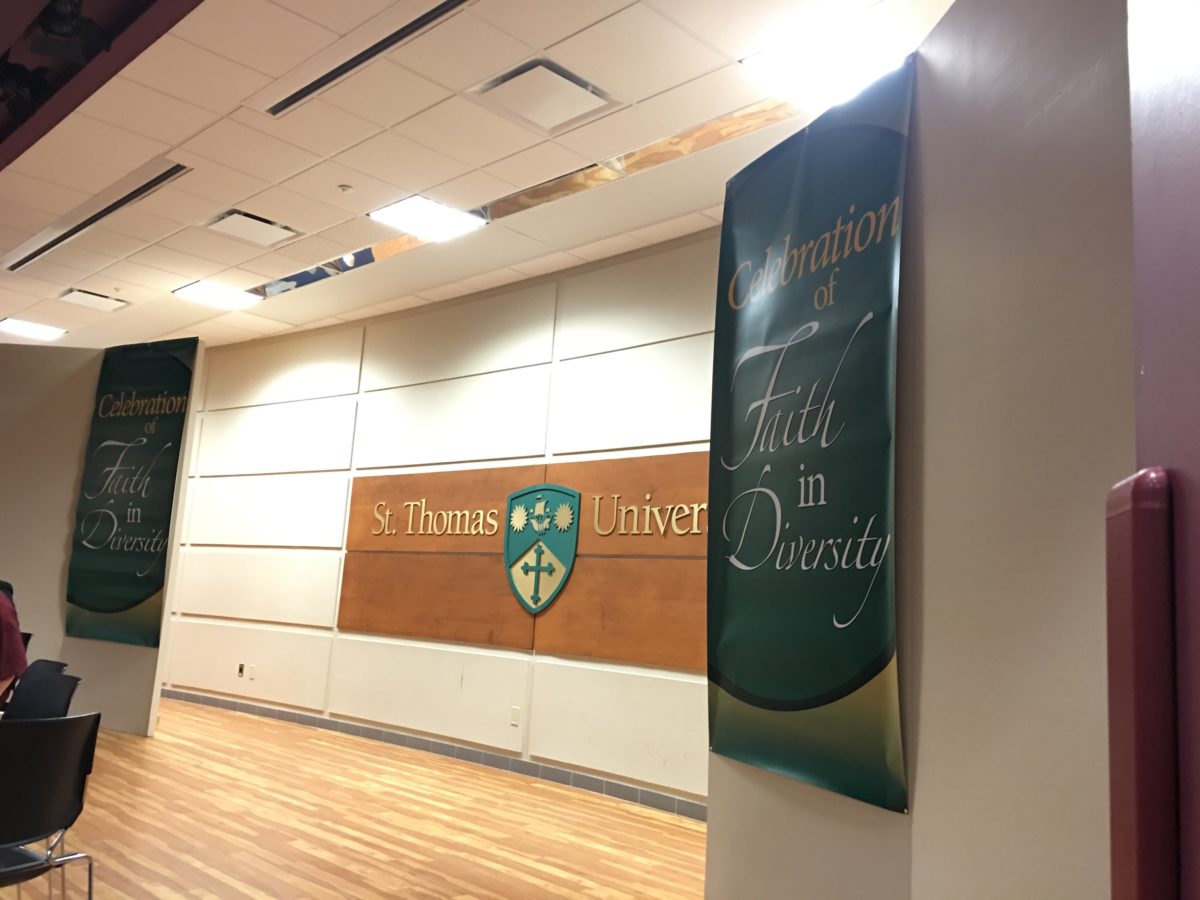The Fredericton community gathered at St. Thomas University’s Kinsella auditorium for a Celebration of Faith and Diversity hosted by associate professor Alexandra Bain’s introduction to religious studies class.
The evening featured a panel discussion, food, socializing and a silent auction.
Bain said she began orchestrating the event to “provide Fredericton’s faith communities with a chance to meet and work with each other and become friends. And after five years, it’s working.”
The panel drew seven faith leaders from the First Nations, Baha’i, Buddhist, Christian, Hindu, Islamic, Jewish and Unitarian faith communities to discuss, among other things, “Home: Its meaning and significance in our lives.”
The 45 students in Bain’s introduction to religious studies class had been preparing for the event since September. In the fall semester of the course, the students designed their own religions in order to learn about the aspects that contribute to forming a faith community—like rituals, symbols and history.
In January, the students began preparing for the Celebration of Faith and Diversity event by working in small groups to arrange food plans, develop a stage design and advertise for the event. They also attended various faith communities’ events, in order to enhance their understanding of religious practices.
“They learn that people choose religious communities for a variety of reasons,” said Bain.
“They’re not just learning about the texts, they’re learning about the people.”
Although this was the first year a panel discussion took place, it proved successful. The panellists answered questions about their daily and annual celebrations, the importance of education and the afterlife. And, as was intended, it opened up a discussion about the definition of home.
“Home is a means or a tool where we can build ourselves and create ties and unity,” said Clement Tahershamsi, of the Baha’i Community of Fredericton.
Father Chadi Kattan, of St. Charbel’s Maronite Catholic Church offered another definition: “Love, respect and safety are what make a place a home,” he said.
Tony Fitzgerald of the Unitarian Fellowship of Fredericton gave a similar definition, “Home is a place where we are safe, a place we are accepted, home is a place where we have a say in what happens and home is a place we take care of. I’m at home when I am anywhere in Fredericton.”
After the panel discussion, attendees enjoyed food supplied by the faith communities. The sweet aroma of various dishes and the tang of steamy coffee swirled through the ground floor of Kinsella.
The diversity in faith was reflected in the diversity and abundance of food. When preparing for the night, the students had been concerned that there wouldn’t be enough food for everyone, but the faith communities all pitched in and brought rabbit stew, samosas, pasta dishes, peppers, grapes, cookies, brownies and hot cross buns.
The event worked like a family gathering. Two young children ran around playing tag and laughing, the old conversed with the young and the faithful chatted with the non-faithful. The soft sound of many voices mingled together, like the chattering voices in a bustling coffee shop.
People exchanged pleasantries, names, ideas and opinions. They acknowledged the differences that divided them, but appreciated the commonalities that unite them.
“Of all the ones I’ve been to, this is the biggest attendance I’ve seen. It’s good to see that people can be friends without sharing the same religious beliefs,” said Glenna Hanley, president of the Unitarian Fellowship of Fredericton.
Students of professor Bain’s class were happy with the turnout and pleased that important questions and opinions could be discussed in a respectful manner.
“Home is where all life is. It is the collective energy of people that make a home wherever we go,” said Miigam’agan, a First Nations Elder.
Certainly the collective energy of some seventy plus people in Kinsella on Tuesday represented everything home encompasses, whatever one’s beliefs.
Next year’s topic is women and faith.

